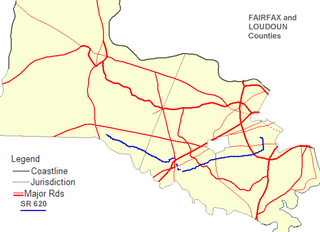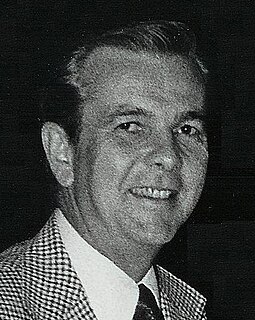Related Research Articles

Fairfax County, officially the County of Fairfax, is located in the Commonwealth of Virginia in the United States. Part of Northern Virginia, Fairfax County borders both the City of Alexandria and Arlington County and forms part of the suburban ring of Washington, D.C. The county is thus predominantly suburban in character, with some urban and rural pockets.

Tysons, also known as Tysons Corner, is a census-designated place (CDP) and unincorporated community in Fairfax County, Virginia, United States, developed from the corner of Chain Bridge Road and the Leesburg Pike. Located in Northern Virginia between the community of McLean and the town of Vienna along the Capital Beltway (I-495), it lies within the Washington Metropolitan Area. Tysons is home to two super-regional shopping malls—Tysons Corner Center and Tysons Galleria—and the corporate headquarters of numerous companies such as Alarm.com, Booz Allen Hamilton, Capital One, DXC Technology, Freddie Mac, Gannett, Hilton Worldwide, Intelsat and Tegna. Tysons is Fairfax County's central business district and a regional commercial center. It has been characterized as a quintessential example of an edge city. The population was 26,374 as of the 2020 census.

Northrop Grumman Corporation is an American multinational aerospace and defense technology company. With 90,000 employees and an annual revenue in excess of $30 billion, it is one of the world's largest weapons manufacturers and military technology providers. The firm ranks No. 96 on the 2020 Fortune 500 list of America's largest corporations.

The Baltimore–Washingtonmetropolitan area is a combined statistical area consisting of the overlapping labor-market region of the cities of Washington, D.C., and Baltimore, Maryland. The region includes Central Maryland, Northern Virginia, three counties in the Eastern Panhandle of West Virginia, and one county in South Central Pennsylvania. It is the most educated, highest-income, and fourth-largest combined statistical area in the United States.
Beltway bandit is a term for private companies located in or near Washington, D.C., whose major business is to provide consulting services to the US government. The phrase was originally a mild insult, implying that the companies preyed like bandits on the largesse of the federal government, but it has lost much of its pejorative nature and is now often used as a neutral, descriptive term.
The Capital Beltway is a 64-mile (103 km) Interstate Highway that surrounds Washington, D.C., the capital of the United States, and its inner suburbs in adjacent Maryland and Virginia. It is the basis of the phrase "inside the Beltway", used when referring to issues dealing with U.S. federal government and politics. The highway is signed as Interstate 495 (I-495) for its entire length, and its southern and eastern half runs concurrently with I-95.

State Route 620 in Fairfax and Loudoun Counties, Virginia is a secondary state highway. The entire length of SR 620 is also known as Braddock Road. SR 620 also has a short concurrency with SR 659 / Union Mill Road in Centreville.

State Route 123 is a primary state highway in the U.S. state of Virginia. The state highway runs 29.27 miles (47.11 km) from U.S. Route 1 in Woodbridge north to the Chain Bridge across the Potomac River into Washington from Arlington. It goes by four local names. From its southern terminus to the Occoquan River Bridge, it is known as Gordon Boulevard. From the Occoquan River Bridge to the city of Fairfax it is known as Ox Road. From Fairfax until it enters the Town of Vienna, it is known as Chain Bridge Road. Then, as it passes through the Town of Vienna, it is known as Maple Avenue. After leaving the Town of Vienna, the name reverts to Chain Bridge Road, and continues this way until the intersection with I-495 in Tysons. Between Tysons and the George Washington Memorial Parkway, it is known as Dolley Madison Boulevard. After crossing over the George Washington Memorial Parkway, the name once again reverts to Chain Bridge Road and continues this way until the end of the road, at Chain Bridge. SR 123 is a partial circumferential highway in Northern Virginia that connects Woodbridge in eastern Prince William County with the independent city of Fairfax and the Fairfax County communities of Vienna, Tysons, and McLean, the last being the home of the National Counterterrorism Center and the Central Intelligence Agency. The state highway also connects all of the major highways that radiate from Washington, including Interstate 95, I-66, US 29, US 50, SR 267, and the George Washington Memorial Parkway. Furthermore, SR 123 crosses another pair of circumferential highways, I-495 and the Fairfax County Parkway, and SR 7, a major northwest–southeast highway through Northern Virginia. The state highway is a part of the National Highway System for its entire length.

Donald Charles Winter is an American politician and businessman who served as United States Secretary of the Navy. A former top executive of TRW, Aerospace & Defense, he was nominated in 2005 by President George W. Bush, confirmed by the United States Senate, and took the oath of office on January 3, 2006. In January 2009 Defense Secretary Gates requested that Winter remain in office until President Obama picked his successor on March 13, 2009. He resigned on March 13.
The Vinnell Corporation is an international private military company based in Herndon, Virginia, United States, specializing in military training, logistics, and support in the form of weapon systems maintenance and management consultancy. Vinnell Corporation is a subsidiary of Northrop Grumman Corporation. They are also party to other joint-venture companies, e.g. Vinnell-Brown & Root (VBR). The Vinnell Corporation was mentioned in Fahrenheit 9/11 for its connections to the Carlyle Group, George W. Bush, and the Saudi Royal family.
BDM may refer to:
John Tilghman "Til" Hazel Jr. is an American attorney and real-estate developer in Northern Virginia who is credited with developing several portions of Fairfax County, Virginia into major commercial and residential areas from the 1960s through the present. He was instrumental in the large-scale development of Tysons, Virginia, which became one of the country's first significant edge cities.
TRW Automotive Holdings Corp. was an American global supplier of automotive systems, modules, and components to automotive original equipment manufacturers (OEMs) and related aftermarkets. Tracing its roots from TRW Inc. it was originally headquartered in Livonia, Michigan. It was created in 2002 when the aerospace company Northrop Grumman purchased TRW and sold its automotive division to Blackstone Group.
Quarterdeck Investment Partners, Inc. is a boutique investment bank headquartered in Los Angeles, California which focuses exclusively on advising clients in the global aerospace and defense sectors. The company was founded in 1992 by Jon B. Kutler, a former U.S. Naval officer and veteran Wall Street investment banker. Quarterdeck was one of the early pioneers in the successful concept of industry focused investment banking boutiques.

Bernard Joseph Dunn was a noted Washington, D.C. area scientist, entrepreneur, and philanthropist. He cofounded Braddock Dunn & McDonald with fellow Fordham University professors in 1959, and served as Chairman of the Board and Chief Scientist.
James Bennett Kelly III serves as Executive in Residence at the University of Pittsburgh Katz Graduate School of Business. For three years he was president and CEO of Flight Explorer, a software and IT solutions provider to the global aviation community. A former pilot, Kelly took the company from a significant loss to profitability while doubling revenue and implementing an exit strategy resulting in the company's acquisition by Sabre Holdings. As the founder of SynXis, a hotel reservation management software provider to over 50,000 hotels, Mr. Kelly served for eight years as president and CEO. Sabre acquired SynXis in 2005. Kelly is a former Vice President, International, of BDM, an 8,000-person Carlyle technical services firm now part of Northrop Grumman. He previously served as International Programs Vice President at SAIC and before that was Deputy Assistant Secretary, Economic Policy, Africa the Near East and South Asia under Secretary Malcolm Baldrige in the second Reagan Administration. Prior to joining the Administration, he held various international engineering marketing positions, worked for several years on Capitol Hill and served six years in the Pennsylvania Legislature. Mr. Kelly is a graduate of Virginia Tech, where he served for ten years on the Pamplin Business School Advisory Board, and ASU's well-known Thunderbird School of Global Management.

TASC, Inc., formerly known as The Analytic Sciences Corporation, Inc., is an American private defense contractor based outside Washington, D.C., in Chantilly, Virginia. Northrop Grumman owned TASC from 2001 to 2009, when it sold the unit to comply with new government conflict of interest rules.
Northrop Grumman Innovation Systems (NGIS) was a sector of Northrop Grumman from 2018 through 2019. It was formed out of Orbital ATK Inc. a company which resulted from the merger of Orbital Sciences Corporation and parts of Alliant Techsystems in 2015. Orbital ATK was purchased by Northrop Grumman in 2018. Northrop Grumman Innovation Systems designed, built, and delivered space, defense, and aviation-related systems to customers around the world both as a prime contractor and as a merchant supplier. It had a workforce of approximately 12,000 employees dedicated to aerospace and defense including about 4,000 engineers and scientists; 7,000 manufacturing and operations specialists; and 1,000 management and administration personnel. With Northrop Grumman's reorganization of its divisions effective 1 January 2020, NGIS was split, with most of the sector merging with other Northrop Grumman businesses into a new Space Systems sector.
Wesley G. Bush is an American systems engineer and business executive. He is the former CEO and chairman of Northrop Grumman, and he is currently a director of General Motors and Cisco.
References
- ↑ Paul Ceruzzi, Internet Alley: High Technology in Tysons Corner, 1945-2005 (Cambridge, MA: MIT Press, 2008)
- ↑ Martha M. Hamilton, "Flourishing Federal Contractors Help to Fuel Region's Economy," Washington Post, February 17, 1980, F1, F6.
- ↑ Harry Jaffee, "The High Priest of High-Tech: Earle Williams and the Future of Fairfax County," Regardie's (July 1985), 58-63.